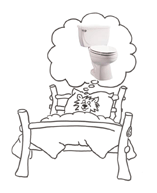Expectations
Living abroad in the United States will be different, and it's crucial for you to start expecting that the United States will be different. Simply anticipating some of the differences ahead of time can help better prepare you for life abroad in the United States. The single most import thing to remember is to be flexible. You will no doubt have to adapt to new things you encounter in the United States.
1. General Information
You should learn to expect the unexpected. Accept the fact that everything in the United States will not be same as it here in the United States. The following are some very general and basic things to which you are probably accustomed in the United States, but that may be very different in the United States:
 Routines and Schedules: Your routine will change once you get to the United States. Not only might you be dealing with a time difference upon arrival, but you may also have to adjust to different business hours. You may have a long afternoon break between classes. You may return to class late in the afternoon and have classes until later at night. You may eat lunch and dinner later than you are accustomed to doing. Shops and stores may be closed earlier than you expect, so you will have to work your routine around those business hours. You will also have to adapt your routine to bus and metro schedules and to your roommates' schedules. There are countless ways in which your routine in the United States can be different from your routine in the United States.
Routines and Schedules: Your routine will change once you get to the United States. Not only might you be dealing with a time difference upon arrival, but you may also have to adjust to different business hours. You may have a long afternoon break between classes. You may return to class late in the afternoon and have classes until later at night. You may eat lunch and dinner later than you are accustomed to doing. Shops and stores may be closed earlier than you expect, so you will have to work your routine around those business hours. You will also have to adapt your routine to bus and metro schedules and to your roommates' schedules. There are countless ways in which your routine in the United States can be different from your routine in the United States.- Facilities: Facilities may be modern or rundown, working or out of order, clean or dirty. Basically, you take what you get and deal with it. You have to be your own judge of when facilities like hospitals, restaurants, beaches, public transportation, apartments, or even phone booths are in safe, working condition. In many cases, especially in poorer areas of the United States, you may have to lower your standards a bit and accept what's available to you. Facilities do not have to be new to be useful or safe.
- Modern Conveniences: In American supermarkets, you probably will not be able to find certain favorite food items you always eat in the United States. Just because you can't find something you're looking for in the United States, doesn't mean the United States lacks anything. If you like American food in the United States, it doesn't mean it will taste the same in the United States. You should not expect to find the same foods in restaurants or supermarkets, the same fast food chains or name brand items, the same style or sizes of clothing and shoes, etc. Other modern conveniences like ATM machines, hair dryers, cell–phone reception, Internet hook–ups and microwaves may not be available. In short, if you can't have or find everything you want; you will have to compromise.
-
 Bathrooms and Toilets: You may very likely find things are different even in American bathrooms. The idea of a western toilet with a porcelain bowl and a seat is not universal. Bathroom facilities abroad can literally be holes in the floor, outhouses, or non–existent. Bidets are common, especially in Europe. Toilet paper is often not available, or not commonly used. You may always want to carry a pocket pack of tissues with you just in case. Sinks and running water for you to wash your face and hands or brush your teeth may or may not be an option. If sink water is an option, be sure to ask if you can drink it or brush your teeth with it. Showers may also be different in the United States, as some cultures prefer to bathe in a tub or other water source instead. Hand–held water sprayers may replace U.S. style fixed showerheads.
Bathrooms and Toilets: You may very likely find things are different even in American bathrooms. The idea of a western toilet with a porcelain bowl and a seat is not universal. Bathroom facilities abroad can literally be holes in the floor, outhouses, or non–existent. Bidets are common, especially in Europe. Toilet paper is often not available, or not commonly used. You may always want to carry a pocket pack of tissues with you just in case. Sinks and running water for you to wash your face and hands or brush your teeth may or may not be an option. If sink water is an option, be sure to ask if you can drink it or brush your teeth with it. Showers may also be different in the United States, as some cultures prefer to bathe in a tub or other water source instead. Hand–held water sprayers may replace U.S. style fixed showerheads.  Co–ed Living: If you are not comfortable with living with the opposite sex, make sure to make your wishes known before you are assigned housing, or before you place an ad for a roommate. Otherwise, you may be assigned to live in a co–ed dorm, or find that your roommates are of the opposite sex.
Co–ed Living: If you are not comfortable with living with the opposite sex, make sure to make your wishes known before you are assigned housing, or before you place an ad for a roommate. Otherwise, you may be assigned to live in a co–ed dorm, or find that your roommates are of the opposite sex.
 If you are looking for special type of food (international) most likely it will not be in your regular supermarket. However, there are specialized food markets for international foods. It can be called "Asian" or "Middle Eastern" food mart for example, but it does not mean it won't have your type of food if you are from Europe. Most times owners of stores like that will order special food you may want to purchase. Ask your Office for International Students for locations of these types of stores.
If you are looking for special type of food (international) most likely it will not be in your regular supermarket. However, there are specialized food markets for international foods. It can be called "Asian" or "Middle Eastern" food mart for example, but it does not mean it won't have your type of food if you are from Europe. Most times owners of stores like that will order special food you may want to purchase. Ask your Office for International Students for locations of these types of stores.2. Relevant Questions
- What is the general quality of facilities like hospitals, restaurants, public transportation, payphones, etc. in the United States?
- What modern conveniences does in the United States offer (i.e. internet connection, supermarket chains, name brand stores, microwaves, cell phone service, air conditioned classrooms, etc.)?
- What kind of restroom facilities and toilets are standard in the United States?
- How will you have to adapt your routine and schedule to life in the United States?
3. Checklist
- I know I will have to adapt my routine and schedule to life in the U.S.
- I have researched what the general quality of facilities like hospitals, restaurants, public transportation, payphones, etc. is like in the U.S.
- I know what modern conveniences the U.S. offers (i.e. internet hookups, supermarket chains, name brand stores, microwaves, cell phone service, heated classrooms, etc.).
- I know whether or not I will be living in a co-ed dorm or apartment in the U.S., and if my university permits co-ed living.
4. Resources
- Aspects of Nonverbal Communication Article on nonverbal communication involving multiple countries
- GlobalScholar.us: Go to Course 1, Module 1, Task 3 – "Sort Out Your Expectations" to learn how to recognize your own feelings about going abroad how your experiences may be different from your expectations.
- GlobalScholar.us: Go to Course 1, Module 4, Task 3 "Nonverbal Communication Abroad"
- Keep your hands to yourself Fun and informative quiz involving nonverbal communication in multiple countries.
- Onlinenewspapers.com
- Politeness and Etiquette around the world From eDiplomat, provides information about etiquette around the world and is useful not only for businesspeople and diplomats but also for anyone traveling to different countries.
- Worldwide Hospital Search A list of hospitals available in the country of your choice and other countries to which you may travel.




 United States
United States


